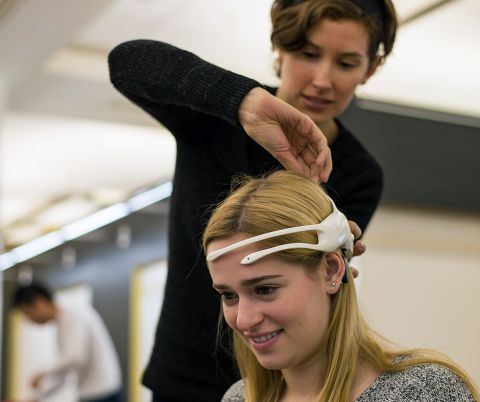Consumer EEG, Mental and Emotional States, Privacy and the Brain (2018-2019)
Electroencephalography (EEG) is a technique that senses electrical activity inside a person’s brain. It uses electrodes that measure the electrical signals produced by the brain's neurons through the scalp. EEG can be used to determine an individual’s level of attention, emotional state and even processing of complex questions. While EEG has been used as a diagnostic tool for more than half a century, consumer-based devices that are simple, portable and easy for individual use are just now on the market.
These consumer-based EEG devices, which are being used by the military and sports teams to detect fatigue, are marketed and sold to everyday consumers for tracking and improving their own brain activity through neurofeedback. This accessibility makes the process of running EEG experiments more efficient, while also allowing for the expansion of EEG research to non-traditional settings. However, these devices raise a unique concern about collecting and sharing data practices because of their unprecedented ability to gather real-time brain activity in everyday situations (e.g., education, employment, fitness or gaming). This collection of neural activity in the brain—and inferences about what that brain activity means with respect to basic internal emotional and physical states is possible.
This Bass Connections project explored consumer attitudes and privacy implications as well as behavior and judgments toward brain data and analytics, and applied principles of neuromarketing to see how these consumer-based devices can be used to detect emotional and mental states in individuals (and how those mental states may be relevant to law).
Team members built on data they collected pertaining to consumer beliefs about the collection of brain data and analytics, and constructed and administered surveys to different groups (the general population, consumer purchasers of EEG devices and neuroscience experts) to determine if people’s experience with brain data affects their attitude toward brain data and analytics. The team submitted abstracts to present collected data at the annual Society for Neuroscience international conference.
Team members also designed a pilot study to determine the ability of consumer-based EEG devices to detect mental states in individuals. They ran participants in “mock juror” focus groups in which they tracked and recorded participants’ emotional and mental states via the devices while they listened to different opening/closing remarks relevant to the legal system. Data collection is ongoing.
Timing
Summer 2018 – Spring 2019
Team Outputs
Consumer EEG, Attention, and Emotion Efficacy (poster by Ian Miles, Raven Leal, Daniel Sprague, Caroline Anderson, Dmitry Isaev, William L.D. Krenzer, Guillermo Sapiro, Nita A. Farahany, presented at Bass Connections Showcase, Duke University, April 17, 2019)
Perceptions of Brain Privacy and Data Sensitivity (poster by Cameron Fox, Kirsten Bleiweiss, Willa Stevenson, Brendan Burg, Xinyi Hong, Shikhar Gupta, William L.D. Krenzer, Nita A. Farahany, presented at Bass Connections Showcase, Duke University, April 17, 2019)
This Team in the News
Meet the Members of the 2019-2020 Bass Connections Student Advisory Council
Building an EEG Lab and Gathering Consumer Opinion on Brain Privacy
See related teams, Consumer EEG Devices: Attention, Emotion, Privacy and the Brain (2019-2020) and Privacy, Consumer EEG Devices and the Brain (2017-2018).

Team Leaders
- Nita Farahany, Duke Law|Arts & Sciences-Philosophy
- William Krenzer, Science & Society
- Guillermo Sapiro, Pratt School of Engineering-Electrical & Computer Engineering
/graduate Team Members
-
Kirsten Bleiweiss, Bioethics and Sci Policy - AM
-
Cameron Fox, Bioethics and Sci Policy - AM
-
Dmitry Isaev, Biomedical Engineering-PHD
-
Lydia Kwong, Bioethics and Sci Policy - AM
/undergraduate Team Members
-
Caroline Anderson, Biology (BS)
-
Brendan Burg, Psychology (AB)
-
Shikhar Gupta, Neuroscience (BS)
-
Xinyi Hong, Psychology (BS)
-
Raven Leal, Neuroscience (BS)
-
Ian Miles, Psychology (AB)
-
Daniel Sprague, Computer Science (BS)
-
Willa Stevenson, Psychology (AB)
/yfaculty/staff Team Members
-
Donald Beskind, Duke Law
